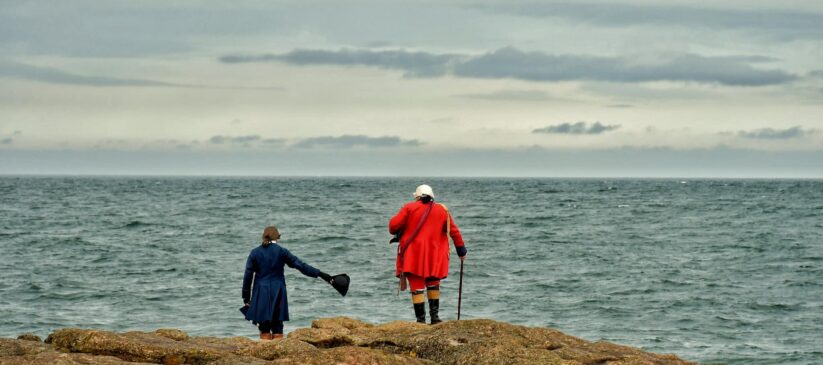
HMS Fox (1740 -1745) was a sixth-rate frigate class ship in the Royal Navy. It measured 32.6m long by 9.45m at its widest, with three masts and a crew of between 150 and 200, with around 23 marines. Built by Buxton’s yard in Rotherhithe, Fox was launched on 1 May 1740. The total cost of building and fitting out the vessel works out at roughly £1.3million in today’s terms. It carried 24 guns.
Fox‘s first captain was Harcourt Masters, and within six months of her launch Fox had already captured two Spanish privateers. In November the captaincy passed to Richard Edwards, who captured another Spanish vessel the Sancta Justa Refina.
In November 1742, Robert Erskine took over as captain, and the following month a group of officers and sailors from the sloop Swift were transferred to Fox when their vessel was sold. Erskine continued Fox‘s successful career, and in 1744 he pursued a French privateer off the coast of Portugal for five hours before catching and seizing her.
On 18 April 1744, Captain Edmund Beavor took over Fox, operating in the north sea. Beavor was born in 1702, and had entered the navy in 1722. One of his officers was Lieutenant Peter Rattenburgh, who had entered the navy as a captain’s servant at the age of 12. These are currently the only two people we can place aboard Fox in its final months.
In the momentous year of 1745, Fox continued her successful engagement of privateers on 15-16 May. The sloop Falcon had been disabled by a French ship of 30 guns and 145 men, but Fox pursued through the night and captured Le Bien Aimé Louis at 10am.
The outbreak of the Jacobite Rising required HMS Fox to support efforts to prevent French naval support of the Jacobites. The moved north to patrol the east coast of Scotland, supporting Sir John Cope’s army as it sailed down from Aberdeen. The general, on landing at Dunbar, borrowed a handful of sailors from Fox to help man his artillery pieces. These men found themselves facing the charge of the Camerons at Prestonpans and fled ignominiously. We do not know if they made it back to their ship, which may have been stationed just off the shore. The first Jacobite reports from the battlefield believed Cope had escaped aboard Fox, suggesting she was in close contact off Prestonpans, and one contemporary plan of the battle clearly shows a naval vessel. There was also a rumour that part of the military treasury was put aboard before the battle, meaning not all of Cope’s funds were seized by the victorious Highlanders.
During the Jacobite occupation of Edinburgh, Captain Beavor hovered off Leith and maintained communication with the garrison at Edinburgh Castle. He sought advice on whether he was expected to open fire on the Jacobite picquets he detected in Leith, concerned about collateral damage.
In November, as the main Jacobite army was marching towards London, the Jacobites in Scotland were preparing a second army. The French were now stirring into action and the situation was extremely uncertain. Then, on 14 November 1745, a terrible gale suddenly blew up along the Forth. The sloop Happy Janet was driven aground near Queensferry, but Fox was even less fortunate. The winds drove Fox towards the shore, ripping across the jagged rocks off the coast of Dunbar. Crippled, the ship tumbled into the Belhaven Bay and broke up. Although some reports suggest 9 men were rescued, Edmund Beavor and all the rest of the crew perished.
 The Derby Mercury newspaper carried this letter, written in Dunbar:
The Derby Mercury newspaper carried this letter, written in Dunbar:
“We are sorry for the Loss of the Fox man-of-war, of whose Crew not a Soul was saved. She came ashore to the West of our Town, at Low Water, and went all to Pieces in the Night. We are saving all that is possible; we have got eight Guns, and the rest we hope to get, with Part of the Rigging.”
The loss of HMS Fox was a human tragedy, and a story often forgotten amidst the other great events of 1745-6. It was also a military setback: the very next day, the first French troops set sail from Dunkirk, to land in Montrose and join the Jacobites.

In 2015, members of the Trust and the Alan Breck’s Regiment were joined by Dunbar Sea Cadets to mark 270 years since the loss of HMS Fox. After prayers in the harbour, a wreath was carried out into Belhaven Bay by Dunbar’s RNLI Lifeboat.
In 2020, despite the coronavirus pandemic, the 275th anniversary was marked with a live-streamed commemoration, which you can watch below.